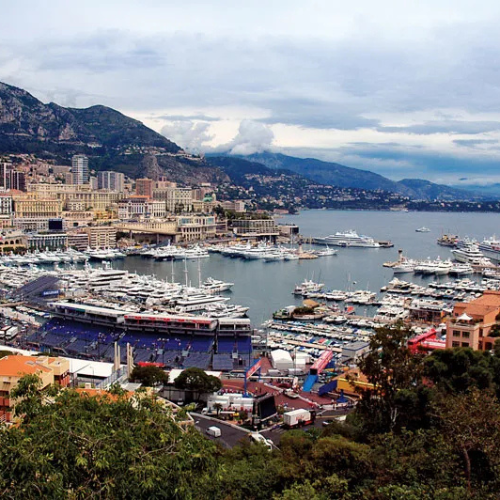In a recent headline-making case, two former Monaco bankers were found guilty of participating in a money laundering operation involving millions of euros. The money was deposited in cash by two Italian businessmen, Fabrizio Amore and Maurizio Fratti, and funneled through Monaco’s banking system. The convicted bankers, Alexandre Balga and Nicolas Gelso, worked for two of Monaco’s most prestigious financial institutions: Banque Havilland and Mediobanca SpA’s CMB Monaco, respectively.
Monaco’s courts fined the two Monaco bankers €10,000 each and handed them suspended jail sentences of up to six months. This means that they won’t serve time behind bars immediately, but if they commit any other offenses in the future, they could face jail time. Their involvement in this financial scandal has put a spotlight on Monaco’s efforts to tackle money laundering and ensure its financial systems are not abused by illegal activities.
The case stems from the illegal depositing of large sums of cash, which often raises suspicions of criminal behavior, especially when the source of the money cannot be verified. In this case, the funds were linked to two Italian businessmen, sparking concerns that the money had been gained through illegal means. The trial and convictions show how Monaco bankers may face consequences when they fail to adhere to proper financial reporting standards or assist in hiding dirty money.
The Role of the Italian Businessmen and Mafia Capitale
At the heart of this case are Fabrizio Amore and Maurizio Fratti, two Italian businessmen who were the ones depositing the large sums of money into Monaco’s banks. Both men were sentenced to one year in prison, with six months of that sentence suspended. They were also fined a staggering €500,000 each. The sentences reflect the seriousness of the crimes they were involved in, but they won’t have to serve the full year behind bars unless they break the law again.
The case has connections to a larger Italian investigation known as Mafia Capitale. This investigation, which began years ago, targeted corruption and organized crime in Rome. Although Amore was named as a suspect in the Italian probe, his defense team argues that he was never convicted in Italy. This is a crucial point for Amore’s lawyers because they believe that money laundering can only be prosecuted if a related crime has been proven. According to them, since Amore was never convicted of a crime in Italy, he should not have been convicted of money laundering in Monaco.
Both Amore and Gelso, the banker who facilitated his transactions, plan to appeal their convictions. Their defense hinges on the claim that money laundering is a “secondary offense,” meaning it requires a conviction for the primary crime that generated the illicit money in the first place. The lawyers argue that without such a conviction in Italy, the Monaco court’s decision should be overturned.
Kennedy Rubia: Allegations of Money Laundering Shadow Busia MCA
Despite the appeals, the court found enough evidence to convict the two Italian businessmen and the Monaco bankers involved, focusing on the illegal nature of the transactions in Monaco, regardless of the outcome of the related Italian investigation.
Other Bankers Involved and Monaco’s Commitment to Fighting Financial Crime
In addition to the convictions of Balga and Gelso, four other bankers were accused of failing to report suspicious financial transactions. Monaco’s financial laws require bankers to report large cash deposits or transactions that seem unusual or suspicious. These reports help authorities identify potential cases of money laundering and stop illegal activities before they become a bigger problem.
Three of the four accused bankers were found guilty of not reporting the suspicious transactions and were fined amounts ranging between €5,000 and €7,000. Two of these bankers were employed by Edmond de Rothschild, another major banking institution in Monaco. However, the most senior banker involved in the case, Patrick Dauguet, the CEO of Banque Havilland Monaco, was cleared of all charges. His acquittal suggests that the case had varying levels of responsibility among the bankers involved.
The banks themselves, including Banque Havilland and CMB Monaco, are not facing any allegations as institutions, but the convictions of these Monaco bankers have raised concerns about the potential for misuse of Monaco’s financial systems. The country has long been known as a hub for wealthy individuals and businesses, and its financial sector plays a key role in its economy.
In recent years, Monaco has worked to improve its financial reputation by implementing stricter anti-money laundering laws. These laws are designed to prevent criminals from using the country’s banks to hide money gained through illegal activities. Last year, Monaco seized half a billion euros in illicit funds, demonstrating the principality’s increasing efforts to combat financial crime.
Monaco’s Chief Public Prosecutor, Thibault, has made it clear that prosecuting money laundering and other financial crimes is a priority for the country. He noted that it is the risk of being checked, arrested, prosecuted, and sentenced that will prevent criminals from trying to launder money in Monaco.
This case involving the Monaco bankers is a significant step in the country’s fight against money laundering and shows that even high-ranking financial professionals are not above the law. By convicting those involved and enforcing strict penalties, Monaco is sending a strong message that it is serious about upholding international standards and preventing financial crimes from taking place within its borders.



